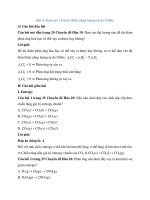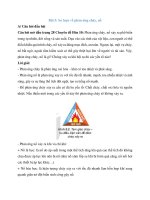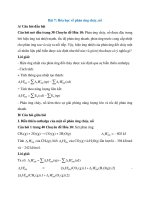ĐỀ CƯƠNG ANH 6 CUỐI kì 1
Bạn đang xem bản rút gọn của tài liệu. Xem và tải ngay bản đầy đủ của tài liệu tại đây (98.63 KB, 6 trang )
ĐỀ CƯƠNG ÔN THI CUỐI HỌC KỲ I
TIẾNG ANH 6 GLOBAL SUCCESS
B. GRAMMAR
I. THE PRESENT SIMPLE TENSE (Thì hiện tại đơn)
Cấu trúc:
Động từ tobe
Câu khẳng định
S+ is/ am/ are
Câu phủ đinh
S+ is/ am/ are +not
Câu nghi vấn
Is/ Am/ Are + S+….?
Động từ thường
S+ V s/es
S+ do/does+ not+ V
Do/Does + S + V?
1. ĐI "S/ ES" CỦA ĐỘNG TỪ TRONG THÌ HIỆN TẠI ĐƠN
a. Quy tắc thêm đuôi s/ es
- Động từ khơng có dấu hiệu đặc biệt: Thêm -s vào sau động từ
Ví dụ: get - gets, take - takes
- Động từ kết thúc bằng các chữ cái -ss, -sh, -ch, -x, -o: Thêm -es
Ví dụ: miss - misses, wash - washes, watch - watches, mix - mixes, do - does
- Động từ kết thúc bằng một phụ âm và -y: Bỏ -y và thêm -ies
Ví dụ: study - studies
- Động từ kết thúc bằng một nguyên âm và -y: Thêm -s vào sau động từ
Ví dụ: play – plays
II. THÌ HIỆN TẠI TIẾP DIỄN.
1. Cấu trúc
Câu khẳng định
S + is/ am/ are + V-ing
Câu phủ định
S + isn’t/ am not/ aren’t + V-ing
Câu hỏi
Is/ Am/ Are + S + V-ing?
3. Cách dùng chính
Dùng để diễn tả một hành động đang xảy ra tại thời điểm hiện nói hoặc xung quanh thời
điểm nói.
Ví dụ:
I am watching a film now.
4. Dấu hiệu nhận biết
Trong câu thường có các trạng từ sau: now, right now, at the moment, at present,...
Trong câu có các động từ như:
Look! (Nhìn kìa!) Look! The tram is coming. (Nhìn kia! Tàu đang đến.)
Listen! (Hãy nghe này!) => Listen! Someone is crying. (Nghe này! Ai đó đang khóc.)
Keep silent! (Hãy im lặng)=> Keep silent! The baby is sleeping. (Hãy im lặng! Embé đang
ngủ.)
UNIT 2: MY HOME
B. NGỮ PHÁP:
I. PREPOSITIONS OF PLACE (GIỚI TỪ CHỈ ĐỊA ĐIỂM)
I. Định nghĩa: Được dùng với các danh từ chỉ nơi chốn, địa điểm, vị trí. Chúng xác định vị
trí của chủ ngữ, nơi xảy ra hành động được mô tả bởi động từ trong câu.
Các giới từ chỉ nơi chốn thường gặp: at, in, on, above, over, before, behind, under, near,
between…
Exercise:
1. Give the correct form of verbs.
1. Sue _does not listen______________ to music in her living room.
(not listen)
2. They _do not eat______________ meat on Fridays.
(not eat)
3. The teacher ___often gives____________ us a lot of homework.
(often/ give)
4. It _often snows______________ quite hard in winter in England.
(often/ snow)
5. We usually __take____ a bus to school.
(take)
6. Helen and Toro _wait______________ for the bus at the bus stop to go to school every
weekdays.(wait)
7. My mother __does not like_____________ buying food in supermarkets. (not like)
8. I _do__________ my homework in the evening
(do)
9. How often __do you go_____________ to the gym to work out?
(you/ go)
10. What language __do they speak_____________ ?
(they/ speak)
Writing
A. Rearrange the sentences to make meaningful sentences
1. house / a / Minh / lake / a / lives / in / near
→ Minh lives in a house near a lake.
2. bedside/ for my bedroom/./ I saw a beautiful/ table but it is small
→ I saw a beautiful table but it is small beside for my bedroom.
3. next to/my bedroom/ I always/ in the garden/ pee/./
→
4. hospital / father / in / the / city / My / a / works / in
→ My father works in a hospital in the city.
5. his / friend / in / family / My / Ha Noi / doesn't / with / live
→ My friend doesn’t live in Ha Noi with his family.
UNIT 3: MY FRIENDS
II. VERB BE AND HAVE FOR DESCRIPTIONS
(SỬ DỤNG TO BE VÀ HAVE ĐỂ MIÊU TẢ)
1. “To be”
Chúng ta thường sử dụng động từ ‘ to be” để miêu tả ngoại hình hoặc tính cách của ai đó.
Dạng khẳng định:
S + to be + adj.
Dạng phủ định:
S + to be + not + adj.
Dạng nghi vấn:
To be + S + adj?
Ví dụ:
I am patient. (Tơi rất kiên nhẫn)
They are intelligent. (Họ thông minh.)
She is young. (Cô ấy rất trẻ.)
He is well built .( Anh ấy thật vạm vỡ).
2. “Have/ has””: có
Chúng ta cũng có thể dùng “have/ has” để miêu tả ngoại hình của ai đó.
Ví dụ:
I have short hair. (Tơi có mái tóc ngắn.)
The cat has green eyes. (Con mèo có đơi mắt màu xanh.)
Ví dụ:
I have short hair. (Tơi có mái tóc ngắn.)
The cat has green eyes. (Con mèo có đơi mắt màu xanh.)
She doesn’t have blond hair.(Cơ ấy khơng có mái tóc xoăn.)
- Câu hỏi Wh- question:
Ví dụ:
- What color eyes do you have? (Bạn có đơi mắt màu gì?)
I have blue eyes. (Tơi có đôi mắt màu xanh dương.)
- What sort of hair does she have? (Cơ ấy có kiểu tóc gì?)
She has curly hair. (Cơ ấy có một mái tóc xoăn.)
A. Give the correct form of verbs.
1. We __do not cook_____________ dinner this evening because we’re eating out. (not cook)
2. _Is Tom driving______________ to work right now?
(Tom drive)
3. They _are not preparing______for the science exam at the moment. (not prepare)
4. When __do you have_____lunch tomorrow?
(you/ have)
5. __Do they give_______ party this weekend?
(they give)
6. Susan __makes_____________ the decision at 3 o’clock this afternoon. (make)
7. I _work_______on a special report today.
(work)
8. What _do you do______________ ?
(you do)
9. Alexander _is studying______________ for his exam at the moment.
(study)
10. She _doesn’t play______________ goft tomorrow.
(not play)
11. They _are making______________ dinner now.
(make)
12. The company _is having______________ dinner now.
(have)
13. She _is eating______________ oysters for lunch right now.
(eat)
14. David __does not fly_____________ to Chicago next week.
(not fly)
15. Which motel _are they staying_________now?
(they/ stay)
Writing
A. Rearrange the sentences to make meaningful sentences
1. Cristiano/ Ronaldo/ short/ has/ hair./ dark
→ C.R has short dark hair.
2. eyes/ sister/ my/ is/ she/ younger/ and/ short/ has/ round.
→ My sister is younger and she has short round eyes.
3. hard-working/ Lam/ is/ student/ class/ intelligent/ in/ an/ my/ and.
→ Lam is an intelligent student and hard-working in my class.
4. going/ on/ we/ to/ the shopping mall/ Saturday/ are.
→ We are going to the shopping mall on Saturday.
5. me/ please/ can/ dictionary/ lend/ you/ a?
→ Can you lend me a dictionary please?
B. Complete the second sentence so that it has the same meaning as the first.
1. Miss Huong's face is round.
→ Miss Huong has a round face.
2. Miss Thanh's legs are long.
→ Miss Thanh has long legs.
3. Her eyes are brown and big.
→ She has brown and big eyes.
UNIT 4: MY NEIGHBOURHOOD
B. NGỮ PHÁP:
I. COMPARATIVE WITH ADJECTIVES (So sánh với tính từ)
1. Cấu trúc:
Tính từ ngắn :
S1 + tobe + adj (er) + than + S2
Tính từ dài :
S1 + tobe + more + adj + than + S2
Ví dụ : This book is smaller than that book. (Quyển sách này nhỏ hơn quyển sách kia)
This book is more expensive than that book. (Quyển sách này đắt hơn quyển sách kia)
BÀI TẬP UNIT 4
1 . VERB FORMS
I. Give the correct form of verbs in the blank.
1. Hoa always (help)
her parents on their farm in her free time.
2. Our summer vacation (start)
in June and (last)
for almost three
months.
3. What do you like (do)
during your vacation?
4. It’s ten to seven. Hurry up or you (be)
late for work.
5. We (go)
swimming every afternoon.
6. Hoa (have)
breakfast with her uncle now.
7. He (not come)
to the party tomorrow night.
8. They (talk)
about Hoa’s work at the moment.
III. Give the right form of "have" or "be" in the simple present tense.
a. Nick (1)
good-looking. He (2)
tall and strong. He (3)
short curly
hair. He (4)
a round face and brown eyes. His mouth (5)
wide.
b. Ann and Laura are twins. They (6)
oval faces and big eyes. They (7)
tall
and slim. Ann (8)
long black hair, but Laura (9)
short curly
hair. Ann has full lips, but Laura's lips (10)
thin.
4. CORRECTION
Choose the underlined word or phrase that needs correcting.
1. There is a temple near to the museum.
A
B
C
D
2. Is there a photocopy store to the left your house?
A
B
C
D
3. The police station is front of the movie theater.
A
B
C
D
4. The bakery is between the hotel or the restaurant.
A
B
C
D
5. There are two drugstores opposite to the hospital.
A
B
C
D
UNIT 5: NATURAL WONDERS OF THE WORLD
B. NGỮ PHÁP:
I. MODAL VERB: MUST
1. Cấu trúc:
Dạng khẳng định :
Dạng phủ định :
Dạng phủ định :
S + Must + V-infinitive.
S + Mustn’t + V-infinitive.
Must + S + V-infinitive?
C. BÀI TẬP:
I. Put the verbs in brackets into Present simple or Present continuous.
1. Sit down! A strange dog (run)
to you.
2. My mom often (buy)
meat from the butcher's.
3. My brothers (not/ drink)
coffee at the moment.
4. Look! Those people (climb)
the mountain so fast.
5. That girl (cry)
loudly in the party now.
6. These students always (wear)
warm clothes in summer.
7. What (you/ do)
in the kitchen?
8. I never (eat)
potatoes.
9. The 203 bus (set off)
every fifteen minutes.
10.Tonight we (not/ go)
to our teacher's wedding party.
5. WRITING
I. Write full sentences, using the suggested words and phrases given.
l. Mexico City/ big/ city/ world.
@ ……………………………………………………………………………………….
2. My brother's room/ big/ my room.
@ ……………………………………………………………………………………….
3. London/ small/ Tokyo.
@ ……………………………………………………………………………………….
4. Hung/ short/ Ba.
@ ……………………………………………………………………………………….
5.Fansipan/ high mountain/ Viet Nam.
@ ……………………………………………………………………………………….







